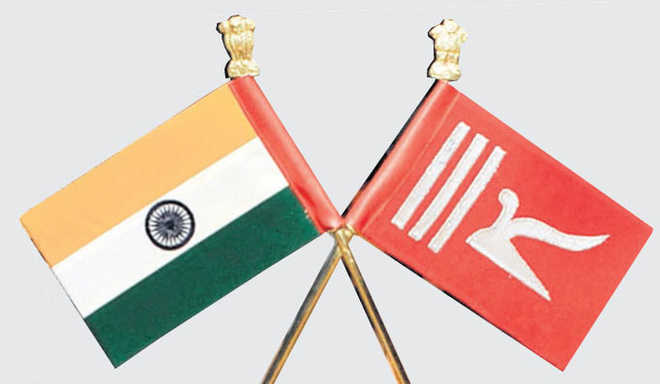Asks constitutional authorities to hoist it on buildings, cars; terms change of Sadr-i-Riyasat with Governor an ‘error’
Ishfaq Tantry,Tribune News Service,Srinagar, December 27
In a judgment being interpreted as a “re-assertion of Jammu and Kashmir’s lost autonomy”, the High Court has asked all the constitutional authorities to hoist the state flag on their vehicles and buildings as mandated under Section 44 of the J&K Constitution. Reiterating the special status enjoyed by J&K under Article 370, the High Court ruled on Saturday that it was an “informed decision” of the J&K Constituent Assembly “not to recommend modification or change in the Article”, and to “allow it to remain” in the same form even after the J&K Constitution came into force on January 26, 1957.The High Court also questioned the Sixth Amendment — also called The Constitution of Jammu & Kashmir (Sixth Amendment) Act 1965 — which replaced Sadr-i- Riyasat with the Governor, by observing that the “elective status of Head of the State was an important attribute of the constitutional autonomy enjoyed by the state”, and a part of the “basic framework” of the state Constitution.The High Court suggested that the J&K Assembly should consider the matter “to uphold the Constitution and rectify an error”. The Sixth Amendment replaced Sadr-i-Riyasat with the Governor, to be appointed by the President and is head of the state. The judgment was delivered by Justice Hasnain Massodi on a petition filed in 2013 by Abdul Qayoom Khan, who served as a Forest Conservator in the J&K government.The petitioner had later on also challenged the PDP-BJP government’s decision to withdraw a controversial circular on March 13 this year related to hoisting of the state flag alongside the Tricolour.Under fire from the political parties, especially the BJP, which has been calling for one flag across the country, the Mufti Mohd Sayeed government had withdrawn the controversial circular, saying it was not approved by a “competent authority”.Experts said the observations made by the High Court with regard to the Sixth Amendment and Sadr-i- Riyasat are “not binding” on government, but it is “duty-bound” to implement the directions with regard to the hoisting of state flag if not appealed against before a larger Bench. Senior High Court lawyer Zaffar Shah termed the judgment “a re-assertion and re-confirmation” of the autonomy of J&K. The government, he said, was duty-bound to implement the March 12 circular which asked for respect to the state flag. Advocate General Jahangir Iqbal said any decision on an appeal could be taken only after receiving the ruling’s copy.
Tricolour to fly alongside, as usual
- As far as the Tricolour is concerned, its position remains unchanged. It will continue to fly alongside the Jammu and Kashmir state flag on all buildings and cars of the constitutional authorities. The provisions of the national flag were extended to J&K in 1950. The petitioner was seeking the same position and sanctity for the state flag.
Creating post of J&K guv unconstitutional, says HC
RINAGAR: Fifty years after the Sadr-e- Riyasat – president and the erstwhile head of the state of Jammu and Kashmir – was replaced by a Centre-appointed governor, its high court on Saturday dubbed the move as unconstitutional. However, the court asked the state legislature to decide on the matter.
The court, while delivering a judgment on a petition over hoisting the state flag at offices of constitutional authority, termed the amendment passed by the assembly in 1965 as being against the “basic structure of the constitution”. “The elective status of head of the state (Sadr-e-Riyasat) was an important attribute of constitutional autonomy enjoyed by the state, a part of the ‘basic framework’ of the state constitution and – therefore – not within the amending power of the state legislature,” a bench of Justice Hasnain Massodi said.
Till 1965, Jammu and Kashmir used to have a Sadr-e-Riyasat as the head of the state – with the power of appointing him vested in the assembly – and a prime minister. Karan Singh, son Hari Singh, the last maharaja of Jammu and Kashmir, was the first – and the last – Sadr- eRiyasat of J&K between 1952 and 1965. However, in April 1965, the state assembly under PM GM Sadiq brought in the Sixth Amendment Act – changing the nomenclatures of Sadr-e-Riyasat and prime minister to governor and chief minister, respectively.

